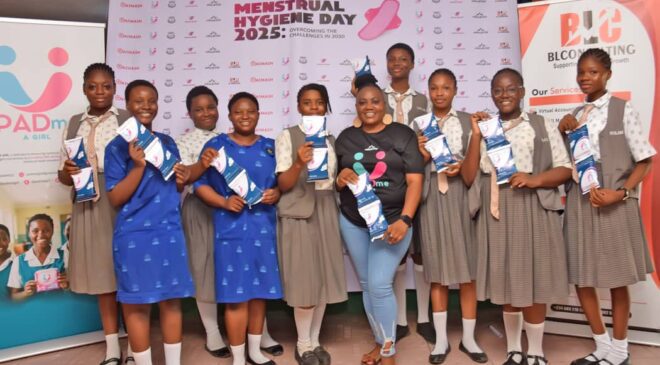
ABUJA/Nigeria: As part of its 2025 Menstrual Hygiene Day activities, the “Pad Me A Girl Initiative,” a flagship campaign of GATMASH MEDIA, held simultaneous outreach programmes on Tuesday, May 27, at Isolog College, Akute, Ogun State, and the Area 1 Internally Displaced Persons (IDP) Camp, Durumi, Abuja, leaving a lasting impact on over 500 girls and young women.
With the theme “Overcoming the Challenges in 2030,” this year’s outreach focused on restoring menstrual dignity, fighting period poverty, and empowering young girls through education and the distribution of essential menstrual hygiene materials.
Unlike symbolic commemorations, the 2025 campaign boldly tackled real menstrual health challenges faced in underserved communities, spotlighting girls in schools and displaced women living in IDP camps, who are often left out of the conversation.
At the Area 1 IDP Camp in Abuja, dozens of displaced girls and women experienced what many described as a life-changing outreach session. The initiative delivered not just hygiene kits but also vital education and emotional support through interactive talks and demonstrations on safe menstrual hygiene practices.
The outreach featured distribution of free sanitary pads, comprehensive hygiene guides, exercise books, pens, and one-on-one counselling sessions. A 14-year-old beneficiary, Zainab Bature, said, “This is the first time someone talked to me about my period in a kind way. I now understand that it is normal, not a curse.”
At Isolog College, Akute, the event took on an empowering tone, held in collaboration with the school’s leadership, and gave the students a rare opportunity for open dialogue around menstruation and self-confidence.
Theresa Moses, CEO of GATMASH MEDIA and Convener of the “Pad Me A Girl Initiative,” in her keynote speech, said the event was more than a date on the calendar. “A girl should not miss school, sports, or success because of her period. This initiative is about restoring what was taken from so many girls: dignity,” she said.
She noted that the initiative had distributed over 2,000 reusable and disposable pads to girls in low-income communities, and had also established a “Pad Bank” to serve those in IDP camps, rural schools, and marketplaces.
“We are committed to making menstrual hygiene a basic right, not a luxury,” Moses added. “Through the Pad Bank, we want to ensure no girl or woman will ever choose between a meal and a pad again.”
Menstrual health, she emphasized, is not just about hygiene but about confidence, inclusion, and gender equality—values central to the mission of the initiative.
Guest Speaker Mrs. Amina Omoike, a media expert and life coach, gave a stirring personal talk during the interactive session, recounting her confusion during her first period. “No one told me it was natural. Today, I tell you—it is not just natural, it is powerful,” she said.
Omoike educated the girls on key hygiene tips, including changing pads every 4–6 hours, washing hands before and after changes, and choosing breathable fabrics. She encouraged them to speak up, ask questions, and support one another. “Shame dies when we speak,” she concluded.
In her welcome remarks, Mrs. Ihomuehe Egumah, Vice Principal of Isolog College, described the programme as “a legacy moment.” She commended the initiative for choosing their school and sowing seeds of confidence in the students.
She urged the girls to embrace their identity and never allow stigma or shame to define their menstruation experience, stressing that education was the greatest tool to break the silence around periods.
Goodwill messages from partners further amplified the campaign’s importance. Mr. Lawal Abiodun Adeyemi of BL Consulting said, “Pad Me A Girl is changing lives, one girl at a time.” Mr. Paul Maduakor, CEO of ProStar Sports International, added, “Periods do not define you—your dreams do.”
At both outreach locations, girls received sanitary pads, pens, exercise books, menstrual hygiene booklets, and information on accessing the Pad Bank. These provisions, according to the organisers, were not just physical items, but tools for confidence and continuity in education.
“This is not just about pads—we are rewriting the story of what it means to be a girl in Nigeria,” Moses said as the events drew to a close, with volunteers, educators, and students sharing emotional moments of gratitude and resolve.
The “Pad Me A Girl Initiative,” which has reached over 2,500 girls across Nigeria, continues to lead one of the most impactful menstrual health campaigns in the country. Through advocacy, education, sanitary product distribution, and the sustainable Pad Bank network, the initiative is fighting to end period poverty and advance menstrual equity nationwide.
